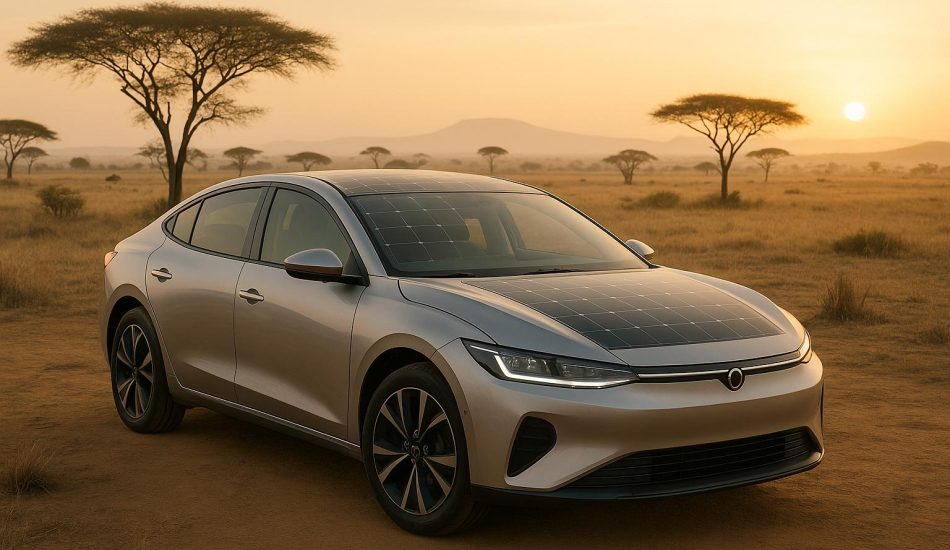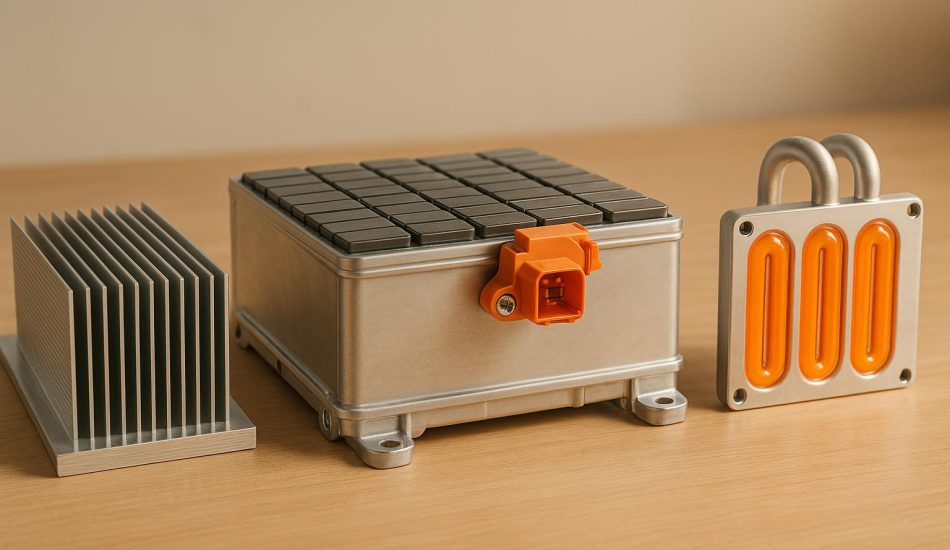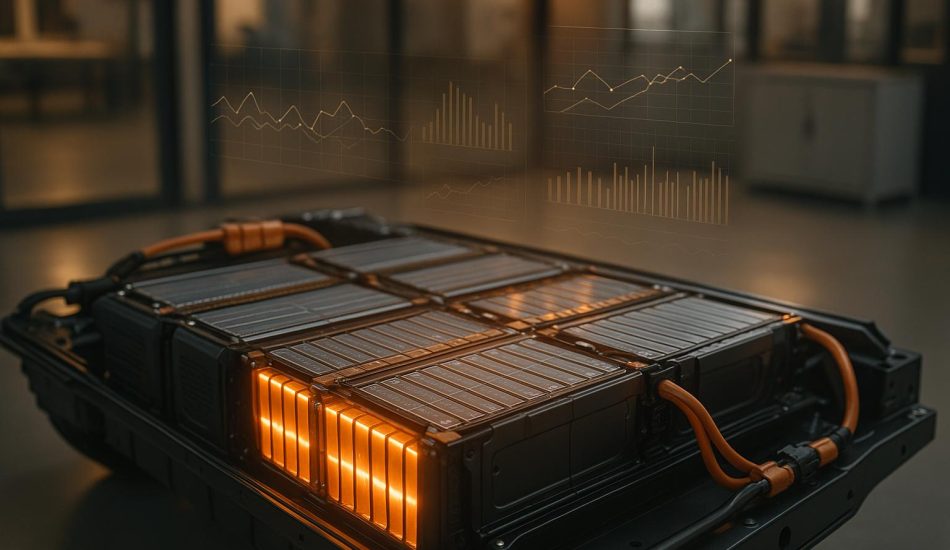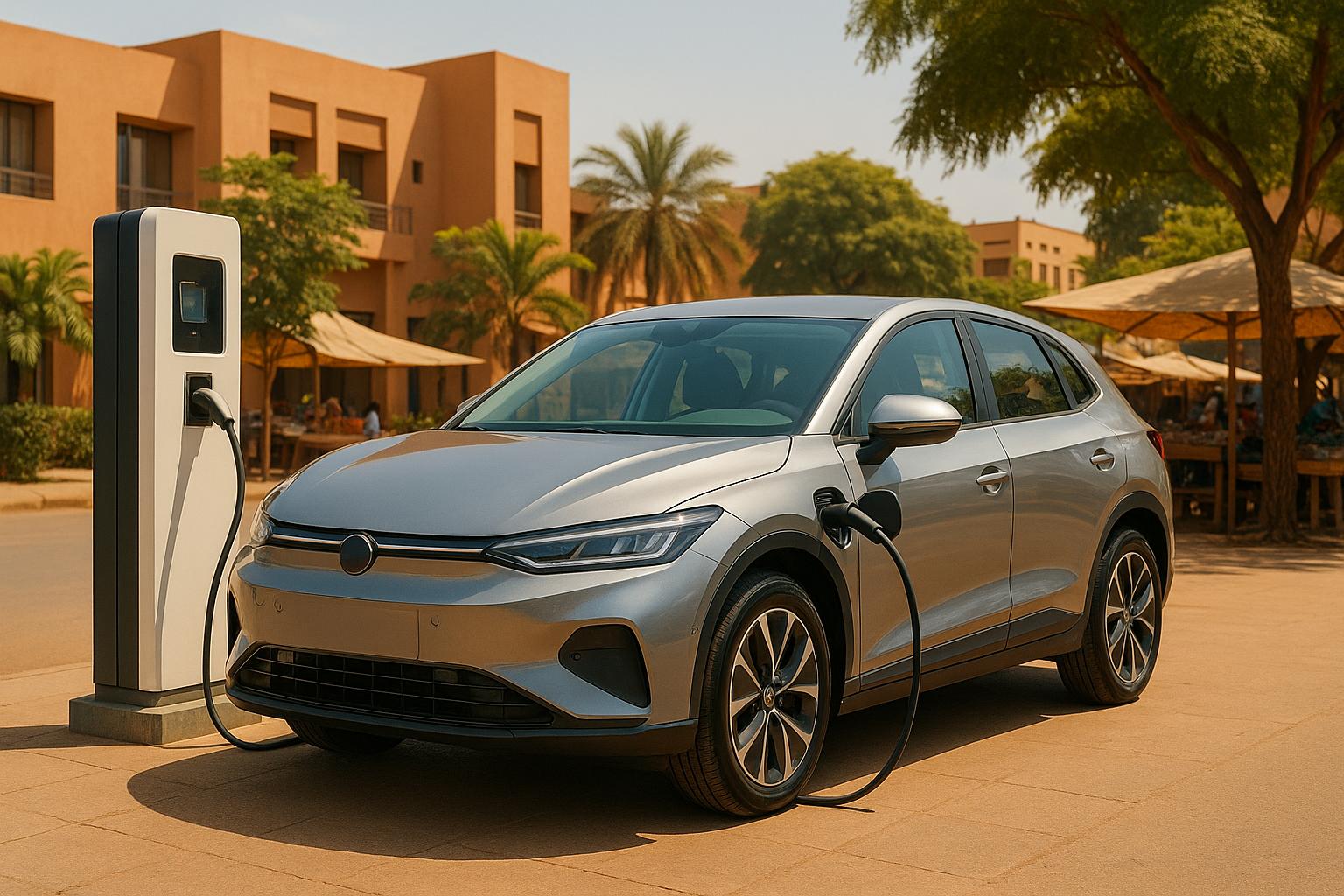
Electric cars are becoming more popular in Mali thanks to rising fuel costs, growing interest in renewable energy, and the availability of solar power. If you’re considering an electric vehicle (EV) in Mali, here’s what you need to know:
- Models Available: Options include the locally designed IBI electric car, which handles Mali’s climate and can recharge using solar energy.
- Pricing: New EVs like the Nissan Leaf (under $30,000) and Hyundai Kona Electric ($34,325) are available. Used EVs offer lower upfront costs but may require more maintenance.
- Financing: Platforms like EV24.africa offer payment plans, extended terms, and "green loans" to make EVs more affordable.
- Charging Infrastructure: Charging stations are expanding, especially in urban areas like Bamako. Home charging solutions are also an option.
- Delivery: Services like EV24.africa handle import, customs, and delivery, ensuring a smooth process.
Switching to an EV can save you money on fuel and maintenance while offering a cleaner driving experience. Consider your budget, driving range needs, and charging options to make the right choice.
Mali’s Electric Vehicle Market in 2025
Market Trends and Developments
Mali’s electric vehicle (EV) market is still in its early stages, with limited data available to paint a complete picture. This makes it essential to keep a close eye on its progress as the market develops. At the same time, the growth of local infrastructure is proving to be a key factor in shaping the future of EV adoption in the country.
Local Infrastructure and Climate Impact
The charging network in Mali is gradually expanding to accommodate the needs of electric vehicle users. Some charging stations are already up and running, and platforms like Paruso offer real-time updates on their locations, connection types, charging speeds, and availability. Additionally, the interplay between Mali’s infrastructure and its climate conditions plays a significant role in determining how well EVs perform in the region.
Electric Car Models Available in Mali
Electric Vehicle Brands and Models
One standout option in Mali’s electric vehicle market is the locally developed IBI electric car, introduced by a Malian entrepreneur. Designed with the country’s unique environment in mind, this car is built to handle Mali’s intense heat and dusty conditions. What sets it apart is its ability to recharge using solar energy, making use of the region’s abundant sunshine.
EV Model Comparison Table
| Model | Brand | Key Features |
|---|---|---|
| IBI Electric | IBI | Designed for Mali’s climate; solar-powered recharging |
For those in Mali seeking a vehicle tailored to their local environment, the IBI electric car offers an option that combines practicality with innovation.
Electric Car Prices and Financing in Mali
New and Used Electric Car Prices
In Mali, the price of electric vehicles (EVs) is influenced by factors like import duties, shipping expenses, and local market demand. New EVs come with cutting-edge technology and a full manufacturer warranty, making them a reliable but often pricier choice. On the other hand, used EVs can be more budget-friendly, though buyers should carefully evaluate battery health, the car’s age, and its maintenance history. Actual costs will depend on the model, features, and related import charges. To make purchasing easier, EV24.africa offers financing solutions tailored to the Malian market.
EV24.africa Financing Options
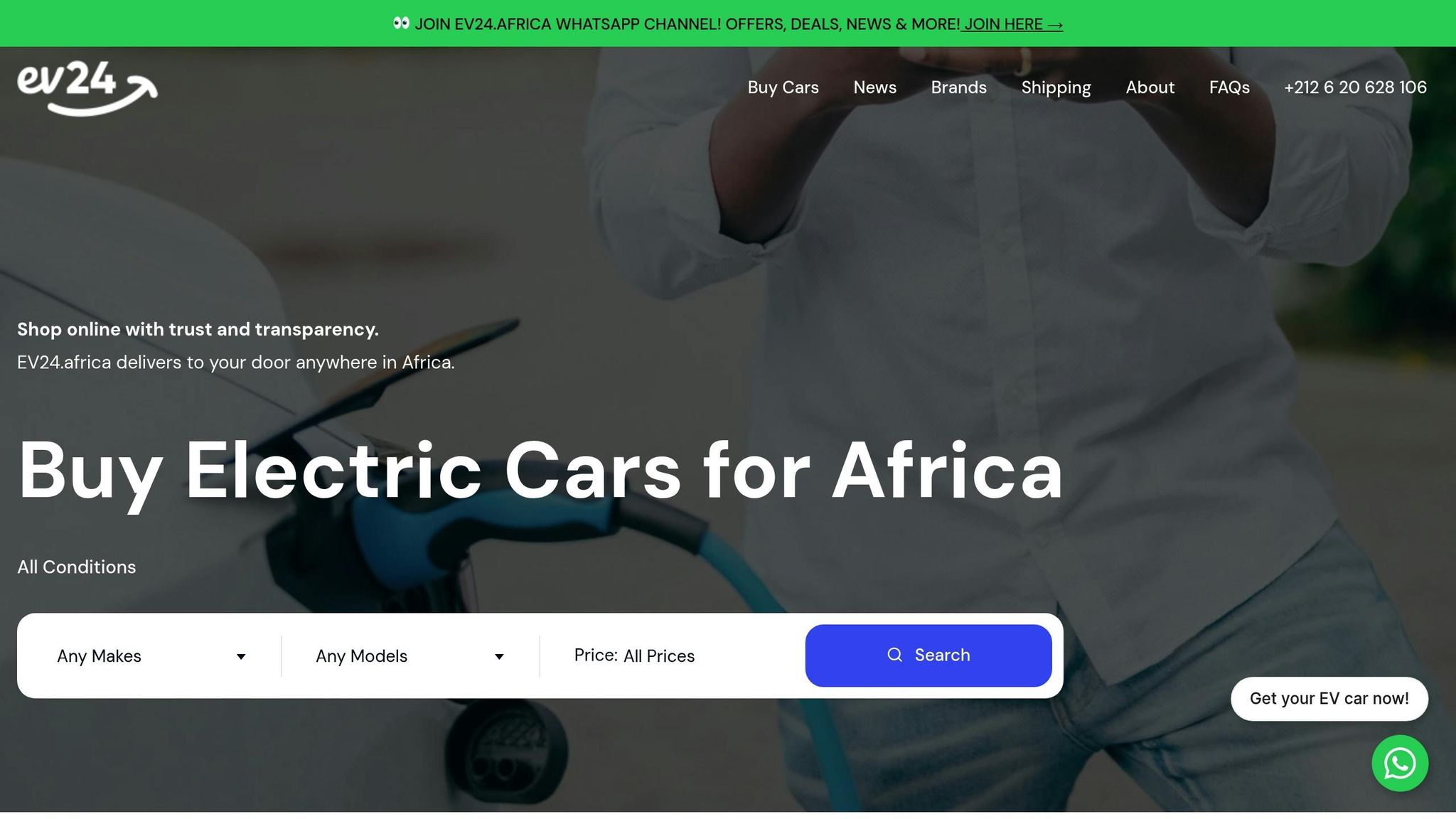
EV24.africa simplifies the process of financing electric vehicles in Mali by offering flexible and transparent options. Their platform focuses on creating payment plans that fit individual budgets, working closely with customers to find the best financial solutions. The company’s financing features include extended payment terms, competitive interest rates, and minimal paperwork, making the process as stress-free as possible.
EV24.africa also partners with local and regional banks to provide "green loans", which often come with better terms for buyers. Acting as an import specialist, the platform ensures customers are connected with trustworthy financing partners. With its commitment to "Transparent Pricing & Financing Options", EV24.africa guarantees a clear and straightforward buying experience without hidden costs, making electric mobility more accessible across Mali.
New vs Used EVs: Pros and Cons
Deciding between a new or used electric vehicle requires balancing various factors. Here’s a side-by-side comparison to help weigh the options:
| Aspect | New EVs | Used EVs |
|---|---|---|
| Initial Cost | Higher upfront cost | Lower purchase price |
| Warranty Coverage | Full manufacturer warranty | Limited or no warranty remaining |
| Battery Life | Optimal performance | Some battery wear possible |
| Technology Features | Latest software and hardware | Older technology |
| Depreciation | Significant early depreciation | Most depreciation already occurred |
| Maintenance Costs | Lower in early years | Potentially higher due to repairs |
| Financing Terms | Often better financing options | May require larger down payments |
| Availability | Longer wait times for production orders | Readily available for purchase |
Both options have their benefits and challenges. Buyers should think about long-term expenses, the condition of the vehicle, and financing options before making their choice.
Delivery and Logistics for Electric Cars in Mali
Shipping and Delivery Process
EV24.africa simplifies the entire process of shipping and delivering electric vehicles. Once customers place an order through the platform, they can choose from a range of trusted brands, including Tesla, BYD, Hyundai, and Toyota, offering both new and pre-owned options. From there, EV24.africa steps in to handle everything – coordinating with suppliers and shipping partners to prepare the vehicle, manage documentation, and arrange local delivery. They also take care of essential import procedures such as customs clearance and vehicle registration. This streamlined approach ensures a hassle-free experience, seamlessly transitioning customers from purchase to delivery.
Delivery Costs and Time Estimates
Delivery costs and timelines are influenced by factors like the vehicle’s specifications, the shipping method chosen, and the destination within Mali. During the ordering process, EV24.africa provides a transparent cost breakdown, so customers know exactly what to expect. Estimated delivery timelines are shared at the time of order confirmation, though these may vary depending on the vehicle’s origin and local logistics. For those in need of a quicker option, express shipping is also available.
Charging Stations and After-Sales Support
Mali’s charging infrastructure is still developing, with most stations concentrated in urban areas like Bamako. To address this, EV24.africa offers guidance on available charging options and assists customers in setting up home charging solutions. Beyond that, the platform connects buyers with qualified service professionals for routine maintenance, minor repairs, and software updates. This ensures that electric vehicle owners in Mali have access to dependable after-sales support, making ownership smooth and worry-free.
sbb-itb-99e19e3
Mali’s Industrial Revolution Toguna Group’s Electric car’s, Sustainable Mining & Agri Innovation.
Electric Vehicle Buying Guide for Mali
If you’re thinking about buying an electric vehicle (EV) in Mali in 2025, there are a few key factors to keep in mind. With more models to choose from and prices steadily dropping, it’s a great time to make the switch. However, understanding the local infrastructure, climate, and financing options – such as those offered by EV24.africa – can help you make the best decision for your needs and budget.
EV Buying Checklist for Mali
Here’s a handy checklist to help you focus on the most important aspects when choosing an EV.
Set Your Budget before diving into the available options. The 2025 market offers affordable choices like the Nissan Leaf for under $30,000 and the Hyundai Kona Electric at $34,325. Don’t forget to consider the long-term savings on energy and maintenance, which can make EVs a cost-effective choice over time.
Know Your Range Needs based on your daily driving habits. Most modern EVs now offer at least 200 miles of range, with many exceeding 300 miles. For city driving in Bamako or other urban areas, a range of 150-200 miles may be sufficient. However, if you frequently travel between cities or venture into rural areas, aim for a range of 250 miles or more to avoid worrying about running out of power.
Check Charging Options in your area. Look into home and public charging availability near you. If possible, plan to install a Level 2 home charging station, which is the most common and convenient option for residential charging.
Consider the Climate and how it may impact your EV. Mali’s heat can affect battery performance, so choose a model with advanced thermal management systems. Some EVs handle extreme temperatures better than others, so this is a critical factor for long-term satisfaction.
Explore Financing Options through platforms like EV24.africa. Understanding your financing choices can make the purchase more accessible and manageable.
Think About Space and Style to match your lifestyle. Whether you need a compact sedan for commuting or a full-size SUV for family trips, the expanding EV market has something for everyone. Keep in mind that EVs often have unique storage layouts due to battery placement, offering extra flexibility.
Once you’ve nailed down your immediate needs, it’s time to look at the big picture – how owning an EV can benefit you in the long run.
Long-Term Costs and Benefits
Lower Maintenance Costs are a major perk of EV ownership. With fewer moving parts, there’s no need for oil changes, and brake wear is reduced. While you should budget for eventual battery pack or motor replacements, these typically aren’t necessary for over a decade of ownership.
Electricity Costs in Mali make EVs a smart choice for daily driving. With most EVs achieving 3-4 miles per kilowatt-hour, the cost per mile is much lower than that of gasoline vehicles. Calculate your expected electricity usage based on your driving habits to get a clearer picture of your monthly savings.
Environmental Impact is another big advantage. EVs produce zero direct emissions, which can improve air quality in cities like Bamako and reduce Mali’s reliance on imported petroleum. As the country incorporates more renewable energy into its grid, the environmental benefits of EVs will only grow.
Advancing Technology means even slightly older EVs are highly capable. Many models from just a few years ago already offer over 200 miles of range and faster charging speeds, making 2025 a great time to invest in electric mobility. Whether you buy new or used, you’ll benefit from these advancements.
Resale Value is worth considering as well. As Mali’s charging infrastructure expands and EVs become more popular, demand for used models is likely to rise. This could help EVs maintain stronger resale values compared to traditional gas-powered cars, which face increasing fuel costs and stricter environmental regulations.
Conclusion: Choosing Electric Cars in Mali
The year 2025 signals a major turning point for Mali’s electric vehicle (EV) market. With more budget-friendly models now on the scene, making the switch to an electric car has become easier than ever. Factors like competitive pricing, advancements in battery technology, and a steadily growing charging network make this an excellent time to consider going electric.
When choosing an EV, focus on your specific needs – whether it’s for daily city driving or longer trips between cities. Today’s electric cars provide dependable range and effective thermal management, ensuring they perform well under various conditions. Plus, the buying process is simpler than you might think, especially with platforms like EV24.africa.
EV24.africa stands out by offering straightforward pricing, detailed vehicle specs, and flexible financing options. They also ensure reliable delivery across Mali, making your purchase hassle-free.
Looking ahead, EVs promise long-term savings through lower maintenance costs and reduced fuel expenses, while also contributing to a cleaner environment. As Mali’s charging infrastructure continues to expand, these benefits will only grow, boosting both the resale value of your EV and your overall savings.
To make a confident choice, consider your budget, driving range needs, and charging options. Use the checklist provided in this guide to evaluate your options, and explore EV24.africa’s financing plans for a seamless transition. This guide combines market insights, practical advice, and tailored solutions to help you confidently embrace the EV lifestyle in Mali.
FAQs
What makes the locally designed IBI electric car a better choice for Mali compared to international models?
The IBI electric car brings a range of benefits that align perfectly with Mali’s needs. Powered by solar energy, it offers an environmentally friendly way to recharge, cutting down on the dependency on imported fuel. With a driving range of over 300 kilometers, it’s well-suited for both city commutes and longer trips.
What sets the IBI apart is its emphasis on affordability. It’s designed to keep operational and maintenance costs low, making it a budget-friendly option for local drivers. By prioritizing efficiency and practicality, the IBI car addresses Mali’s transportation challenges with a forward-thinking approach.
How does Mali’s hot climate impact electric vehicle performance, and what features should I consider for better durability?
Mali’s scorching temperatures, often soaring past 104°F, can take a toll on electric vehicle (EV) batteries. Extreme heat not only affects battery efficiency but can also lead to faster wear, shortening battery life and cutting down driving range if left unchecked.
To keep your EV running smoothly in Mali’s challenging climate, prioritize models equipped with active thermal management systems. These systems help regulate battery temperature and prevent overheating. Additional features like battery pre-conditioning, ventilated seats, and advanced cooling systems can play a crucial role in preserving battery health while also enhancing comfort. These upgrades are key to ensuring your EV lasts longer and performs reliably in high-heat conditions.
How can I set up a home charging station for my electric car in Mali, and what should I know before starting?
To install a home charging station for your electric vehicle in Mali, the first step is choosing a Level 2 charger. These chargers typically need a 240-volt circuit with a capacity of 30 to 50 amps. Before proceeding, have a licensed electrician evaluate your home’s electrical system to ensure it can support the charger. The electrician can also handle the wiring and outlet installation.
It’s essential to review local regulations to determine if any permits are required and to ensure the setup aligns with Mali’s electrical codes. For both safety and reliability, always hire qualified professionals for the job. When selecting a spot for the charging station, aim for a location that is convenient to access and offers protection from the elements.


